Alan Grant 1949-2022
21st July 2022
Everyone at 2000 AD and Rebellion is devastated to hear of the passing of Alan Grant.
Grant was one of his generation’s finest writers, combining a sharp eye for dialogue and political satire with a deep empathy that made his characters seem incredibly human and rounded. Through his work he had a profound and enduring influence on 2000 AD and on the comics industry.
Born in Bristol in 1949, he grew up in Scotland where he was frequently beaten by his teachers for being naturally left-handed and regularly expelled, the injustice of his treatment giving him a powerful distaste for authority which saturated his writing. However, this was leavened by a mischievous and wicked sense of humour that was at times scatalogical and at others soulful.
After working briefly in a bank, Alan answered a newspaper advertisement for ‘trainee journalists’ and, at the age of 18, joined DC Thomson, the Dundee-based publisher and home to the Beano, where he met John Wagner and Pat Mills. Assigned a horoscope column for the Dundee Daily Courier, he and fellow sub-editors John Hodgman and John Wagner would compete to see who could write the most ridiculous predictions. ‘It got worse and worse,’ Grant told the Judge Dredd Megazine in 2008. ‘”Sagittarius, the stars are against you today — it might be safer to stay inside. Do not be surprised if a close family member suffers an accident!”’
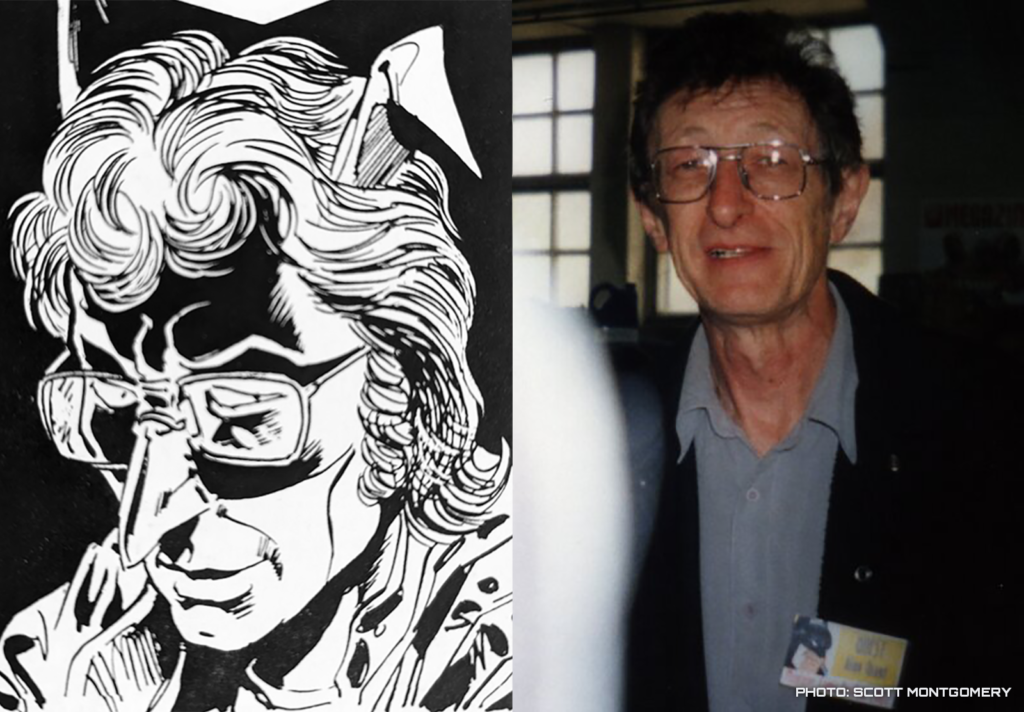
He moved to London in 1970 to work for publisher IPC as a writer and sub-editor on romance magazines, but after being invited to write a strip for the short-lived Starlord, editor Kelvin Gosnell offered him an editorial position on 2000 AD.
In addition to editing scripts, Grant soon realised that 2000 AD had an urgent need to find and nurture new writing talent and he is credited as finding a script from unknown writer Alan Moore in the unsolicited submissions pile, which was the beginning of a career that would come to profoundly change comics. ‘I got a brilliant letter back from Alan Grant,’ Moore recalled, ‘he went out of his way to encourage people who he thought had talent.’
Dissatisfied with IPC, Alan quit in the summer of 1980 and his robotic alter ego, AALN-1, was written out of the stories of alien editor Tharg the Mighty with a heroic death in the two-part story ‘The Great Human Rip-Off’ in 2000 AD Progs 176-177.
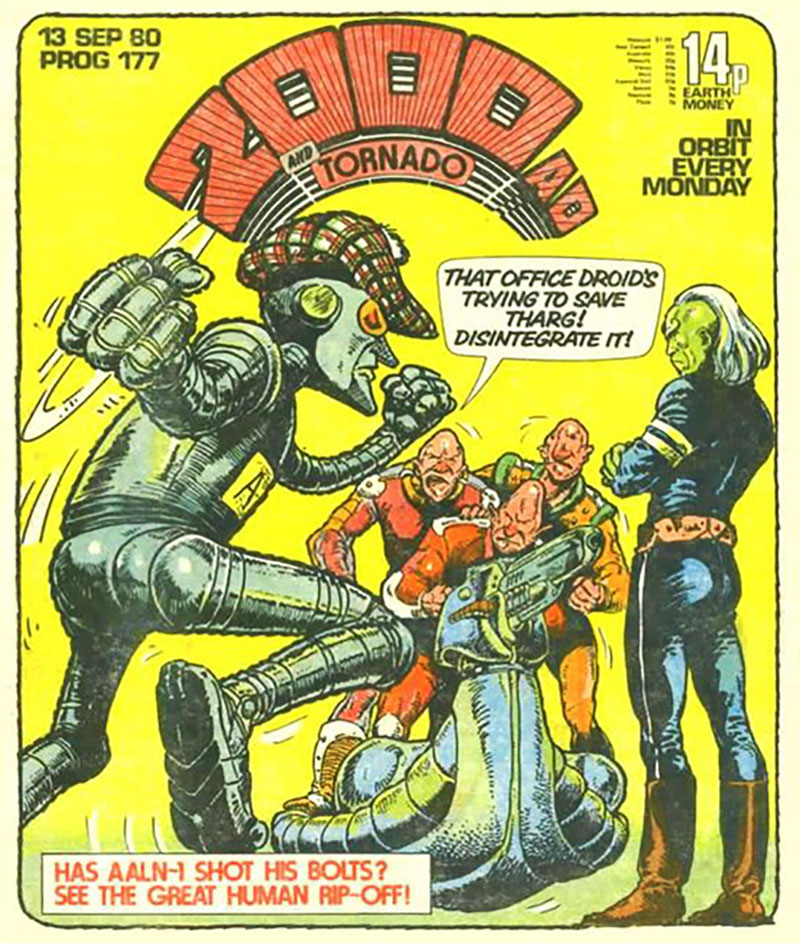
However, he found himself unemployed when a job editing puzzle magazines fell through. John Wagner – who lived with Alan in London and was suffering from ill health – asked him if he could help with his growing workload.
Under the pseudonym T.B. Grover, the pair became a powerhouse. Beginning mid-way through ‘The Judge Child’ saga, their partnership redefined Judge Dredd, their black humour and wild imaginations forging what many consider to be the strip’s first great ‘golden age’. It was on the floor of Alan’s grand home in the Essex countryside that he and John Wagner, surrounded by newspapers, would sit and turn the day’s news into inspiration for quotidian tales of mass unemployment, violent fashions, and hubristic criminals, interspersed with towering epics such as ‘The Apocalypse War’ and ‘City of the Damned’.
Soon writing under the own names, on mutant bounty hunter series Strontium Dog they explored the nature of both prejudice and loyalty, while they let their madcap humour shine through on sci-fi private detective caper Robo-Hunter and space trucking comedy series Ace Trucking Co..
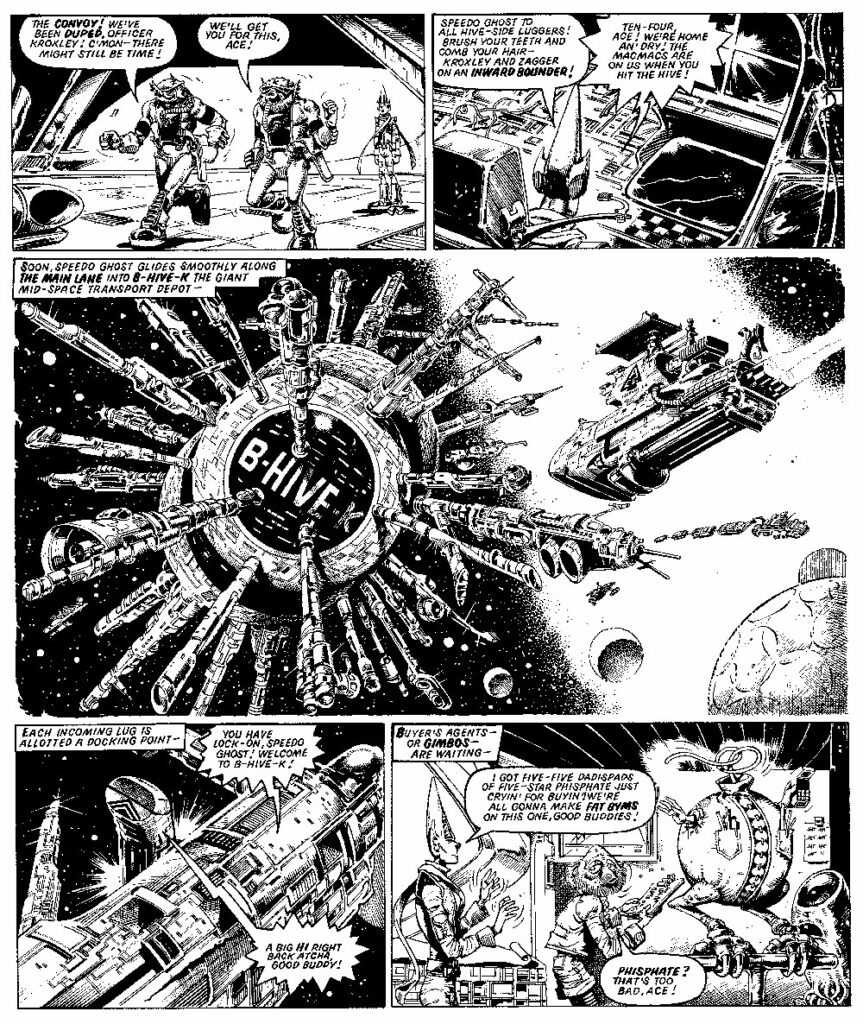
Yet even in the silliest of scripts there was always a sharply political edge to Alan’s writing. Drawing on disdain for the populist authoritarianism of Margaret Thatcher, stories such as ‘John Cassavetes is Dead’ and ‘A Letter from a Democrat’ mocked and criticised the country’s right-ward turn. However, Alan was no dogmatic ideologue. He was inspired by both left-wing anarchism and Eastern philosophy (including the work of a Tibetan lama who turned out to be a plumber from Devon) and remained a fierce and strongly independent thinker.
‘As someone who was thrown out of the Young Conservatives for being too Labour-minded and was thrown out of the Socialist Party for being too Conservative minded, basically what both parties were saying was that I was just too argumentative for either of them,’ he said in 2021.
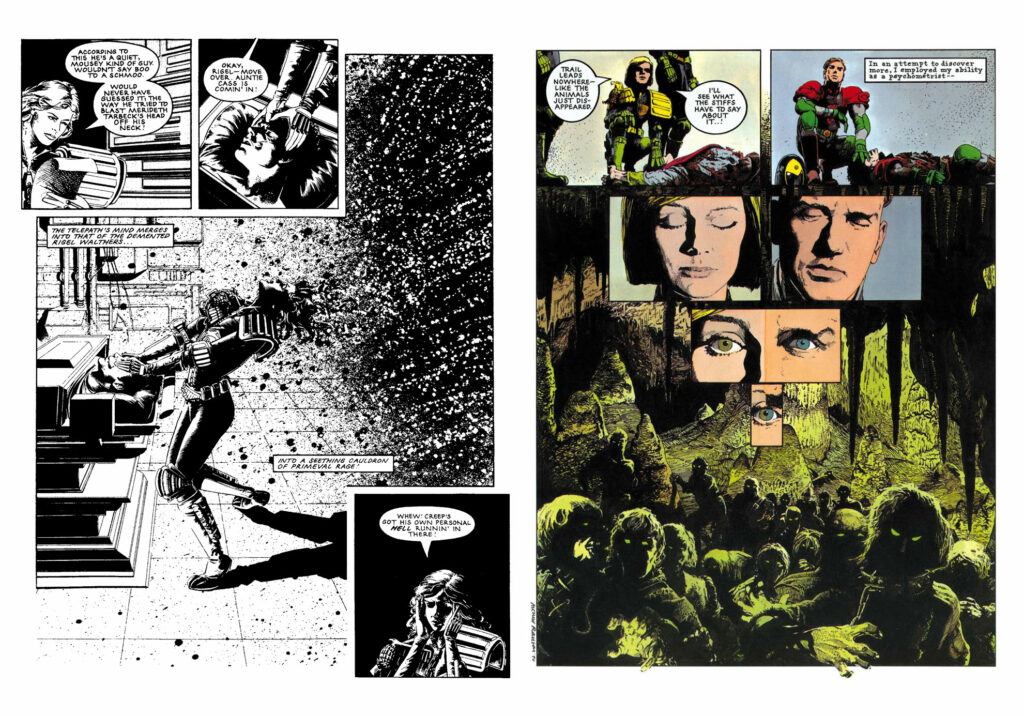
From the mid-1980s, Alan wrote the solo adventures of the irreverent psychic Judge Cassandra Anderson, including a string of stories in the 1990s in which she went on a voyage of self-discovery.
It was the Judge Dredd mega-epic Oz, when they disagreed over whether Dredd should kill teen sky-surfer Chopper, that signalled the end of the writing partnership. Splitting their strips between them, Wagner kept Judge Dredd and Grant Strontium Dog and Judge Anderson. Unhappy and dissatisfied with IPC’s policies over royalties and character ownership, Alan wrote ‘The Final Solution’, killing off Strontium Dog lead character Johnny Alpha to put him out of the reach of other writers, a decision he said he later regretted and which co-creator Carlos Ezquerra refused to draw.
Although they no longer worked together regularly, Alan and John did collaborate on particular projects, such as the Batman/Judge Dredd crossover Judgement on Gotham, The Last American for Marvel’s Epic imprint, the twelve-issue Outcasts for DC Comics, and their creator-owned series The Bogie Man.
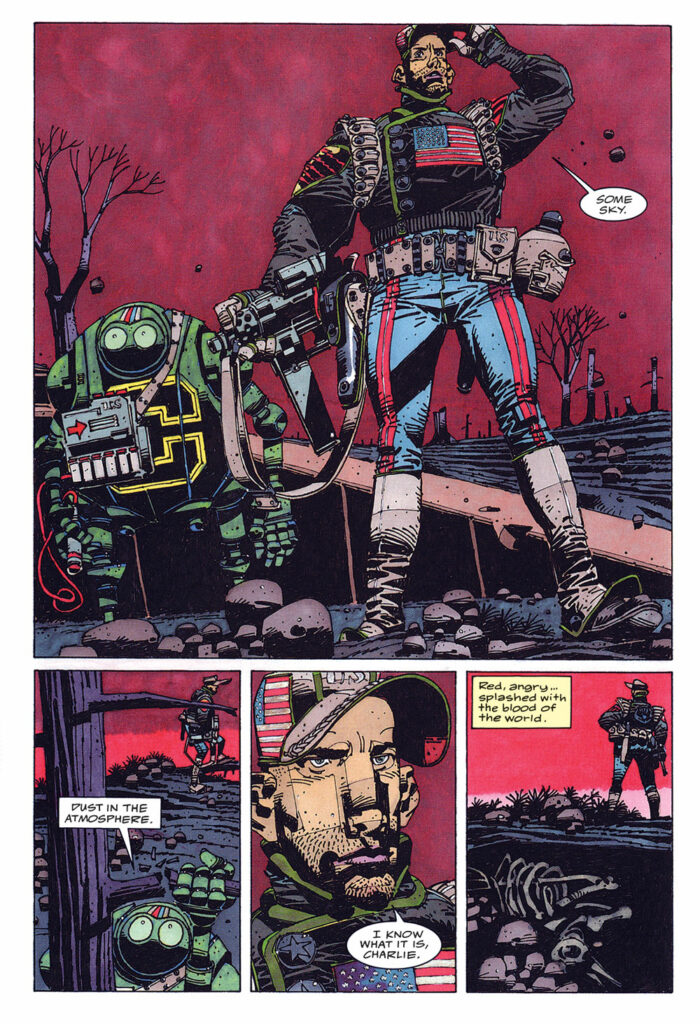
Alan began an acclaimed run on DC Comics’ Detective Comics and Batman – at first with Wagner and then solo – and worked with artist Norm Breyfogle for a decade, where his Anarky character carried something of Chopper’s independent spirit. He also helped popularise DC’s anarchic brute Lobo, initially with artist Simon Bisley.
He continued to work for 2000 AD throughout the 1990s, mainly on Anderson, Psi Division, where his partnership with artist Arthur Ranson produced incredibly beautiful stories such as Shamballa and Satan, and the three-volume series Mazeworld, inspired by three months he spent in prison for possession of LSD in 1969.
Although ill for some time, Alan continued to write. His last work for 2000 AD was a Judge Anderson story in 2018 and a war story in the Battle Special in 2020.
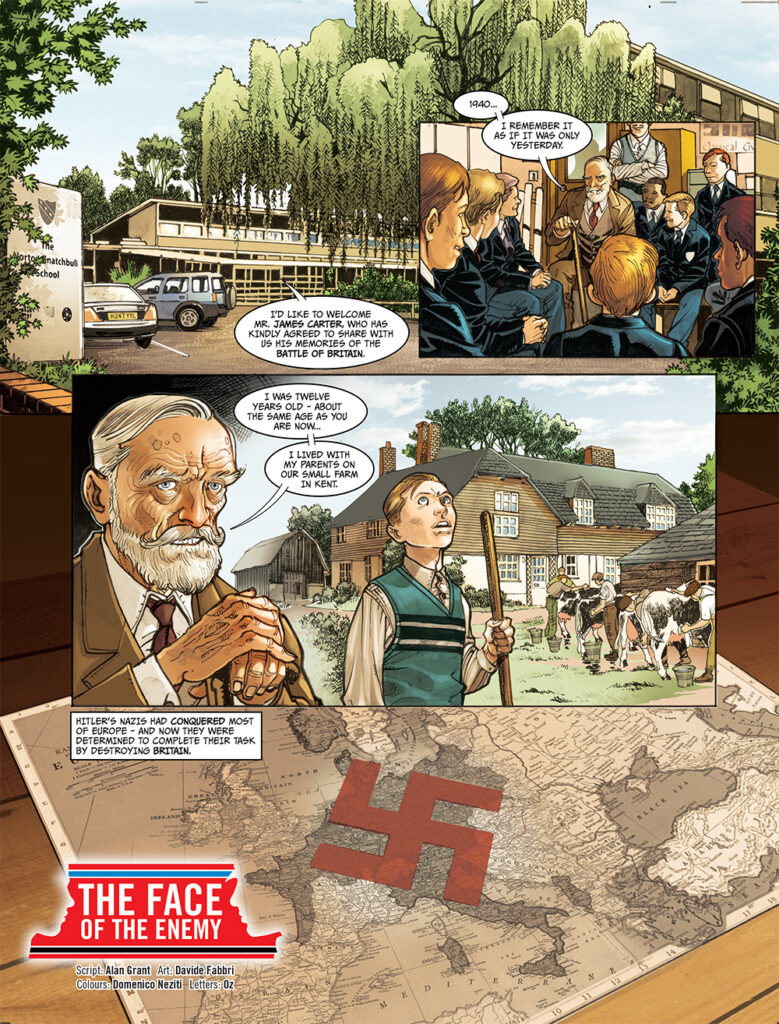
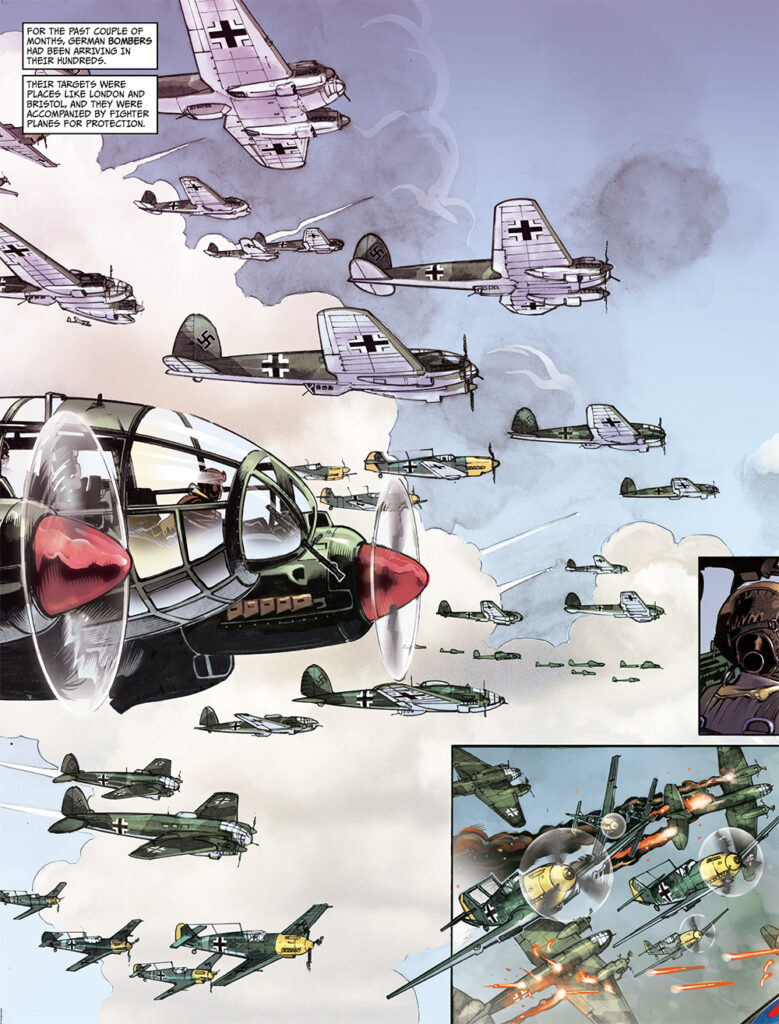
For several years, Alan and his wife Sue organised a much-loved comics festival in their village of Moniaive in Dumfriesshire, as part of a community re-invention as a ‘Festival Village’ tourist destination after foot-and-mouth disease devastated the area in 2001.
For the generations who grew up reading Alan’s work for 2000 AD, who were touched by the pathos and compassion of his characters, who felt the joy of their victories and the sting of their deaths, Alan’s passing is a painful gut punch.
His impact on comics and standing in the industry simply cannot be understated. But he was more than just a giant in his field – he was a fascinating man whose sharp wit and boundless warmth touched all those who met him. One cannot separate 2000 AD from Alan Grant, his humour, humanity, and intelligence made it what it is, and his talent was integral to its success.
We are forever poorer without him.
Our deepest condolences go out to his family and his friends.
Rest well and thank you, Alan.

